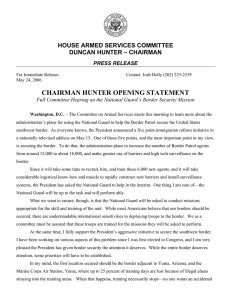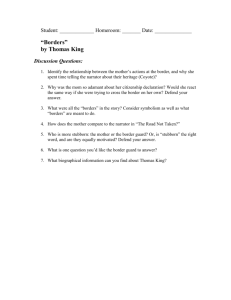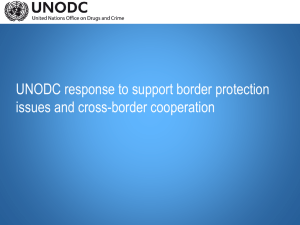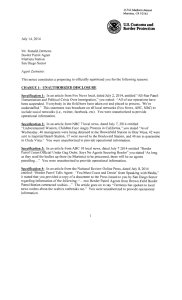STATEMENT OF David V. Aguilar Chief
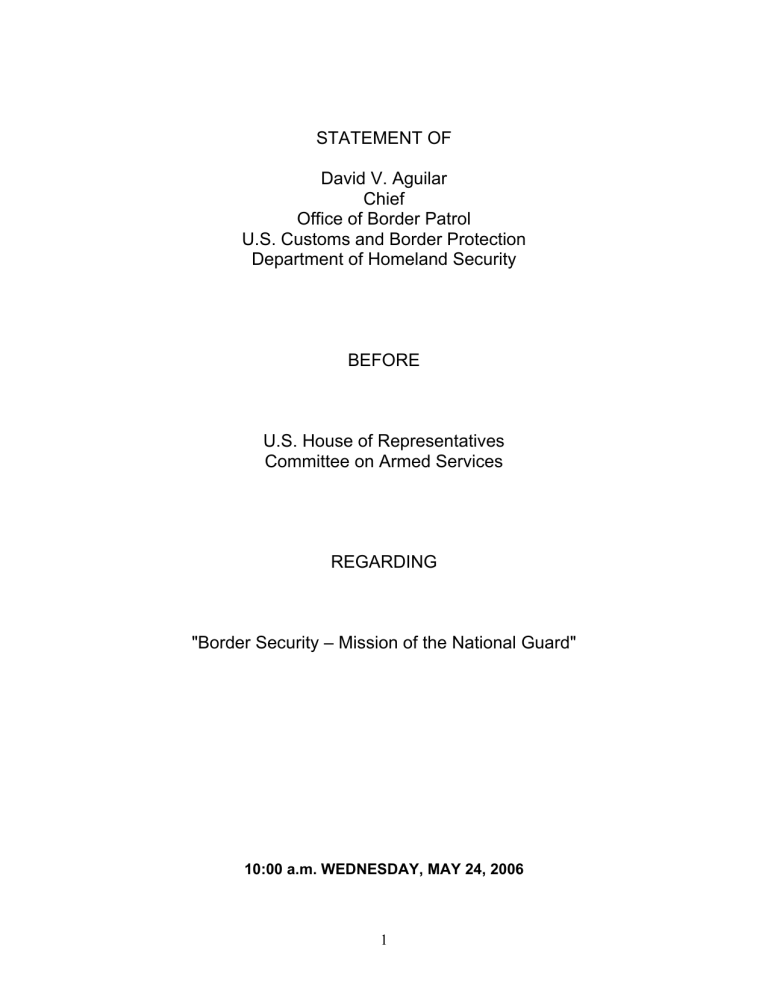
STATEMENT OF
David V. Aguilar
Chief
Office of Border Patrol
U.S. Customs and Border Protection
Department of Homeland Security
BEFORE
U.S. House of Representatives
Committee on Armed Services
REGARDING
"Border Security – Mission of the National Guard"
10:00 a.m. WEDNESDAY, MAY 24, 2006
1
Chairman Hunter, Ranking Member Skelton, Members of the Committee, it is a privilege and an honor to appear before you today to discuss the role the
National Guard will play in assisting the Department of Homeland Security, and especially U.S. Customs and Border Protection (CBP), in our mission of securing our Nation’s borders.
The DHS and CBP remain steadfast in our commitment to gain control of our borders, and the recent announcements by the President will move us rapidly forward on that commitment. Let me first state that National Guard support of and coordination with DHS and the Border Patrol is nothing new. While this new infusion will be on a larger scale, the Border Patrol has a history of nearly two decades working with National Guard units to utilize their unique expertise, manpower, technology and assets in support of our mission and as a force multiplier. Today there are currently hundreds of National Guard troops assisting
DHS, primarily in our counter narcotics mission.
CBP acts as the guardian of our Nation’s borders, safeguarding the homeland by protecting the American public against the entry of terrorists and the instruments of terrorism, while enforcing the laws of the United States and fostering the
Nation’s economic security through lawful travel and trade. Within CBP’s larger mission, the Border Patrol's time-honored duty of interdicting illegal aliens and drugs and those who attempt to smuggle them across our borders between the ports of entry remains a priority. The nexus between our post September 11 th mission and our traditional role is clear, terrorists and violent criminals may exploit smuggling routes used by migrants to enter the United States illegally and do us harm. Reducing illegal entries across our borders is more than ever a matter of national security.
Since 2001, border security funding has increased by 66%. Today, the Border
Patrol has increased to 11,583 agents. Since 2001, the Border Patrol and DHS components have apprehended and sent home more than 6 million people
2
entering America illegally. In fiscal year 2005 alone, the Border Patrol apprehended nearly 1.2 million undocumented aliens attempting to enter the
United States illegally. So far in fiscal year 2006, apprehensions of illegal aliens are up 5 percent and seizures of marijuana are up 26 percent. Despite the progress we have made, we do not yet have control of our border.
To work towards operational control of the border, President Bush has announced a plan to increase the number of Border Patrol Agents by 6,000 by the end of 2008. DoD support will be an immediate, short-term measure that allows the DHS to increase their deterrence and border security capabilities while
DHS trains additional Border Patrol Agents and implements the Secure Border
Initiative. These units will support DHS where they will be most effective. One of many capabilities the National Guard Bureau will provide is an increased detection capability to allow a quicker response by law enforcement officers.
National Guard units will assist DHS by executing missions such as logistical and administrative support, operating detection systems, providing mobile communications, augmenting DHS’s border-related intelligence analysis efforts, building and installing border security infrastructure, providing transportation and training. However, law enforcement along the border between the ports of entry will remain the responsibility of Border Patrol Agents. The National Guard will play no direct law enforcement role in the apprehension, custodial care or security of those who are detained. With the National Guard providing surveillance and logistical support, DHS law enforcement officials will be free to concentrate on law enforcement functions of border enforcement. The support of tactical infrastructure engineering and technology by the National Guard will be a tremendous force multiplier for DHS; therefore making DHS law enforcement officials, and especially Border Patrol Agents more effective, freeing up additional current Agents who are performing some of these support tasks today.
3
In addition to providing support to the Border Patrol, the National Guard maybe used to provide support to other critical DHS requirements along the border including temporary construction of detention facilities, intelligence support to ICE and CBP, transportation of aliens within the United States, and possibly augmentation of CBP officers at Ports of Entry, if necessary.
As I noted before, the Border Patrol and the National Guard have an established relationship that existed well before the President’s announcement last week.
Guard units and personnel have been supporting counter-drug operations, in addition to conducting missions ranging from engineering support to aerial reconnaissance. In San Diego, the National Guard has worked on the San Diego
Border Infrastructure System, and in Arizona, the National Guard has constructed roads for use by the Border Patrol. For nearly two decades, these types of missions have been utilized as valuable training for National
Guardsmen, and have all been conducted in standard two to three week rotations as part of the Guard’s annual training. The results of these missions have greatly improved the Border Patrol’s ability to access terrain and enforce the law between our Nation’s ports of entry. The President’s plan expands this successful relationship to a larger scale, and although the force will be larger, the mission will remain the same as it has been for nearly two decades.
With the addition of National Guardsmen, over 500 Border Patrol Agents who are currently working in clerical, transportation, and logistics jobs will return to the front lines to assist in the detection and apprehension of illegal aliens.
Additionally, under the President’s plan, the Border Patrol will hire and train an additional 6,000 Border Patrol Agents during 2007 and 2008. This will bring the total number of Border Patrol Agents to over 18,000, a 101 percent increase since the President took office in 2001.
We recognize the challenges that lie ahead. Our national strategy gives us the overall framework to achieve our ambitious goal and with the assistance of the
4
National Guard, our DHS law enforcement officials charged with border control will be able to more effectively and efficiently protect our Nation’s borders between our ports of entry.
The men and women of the Border Patrol face these challenges every day with vigilance, dedication to service, and integrity as we work to strengthen national security and protect America and its citizens. I would like to thank you for the opportunity to present this testimony today. I look forward to responding to any questions that you might have at this time.
5
